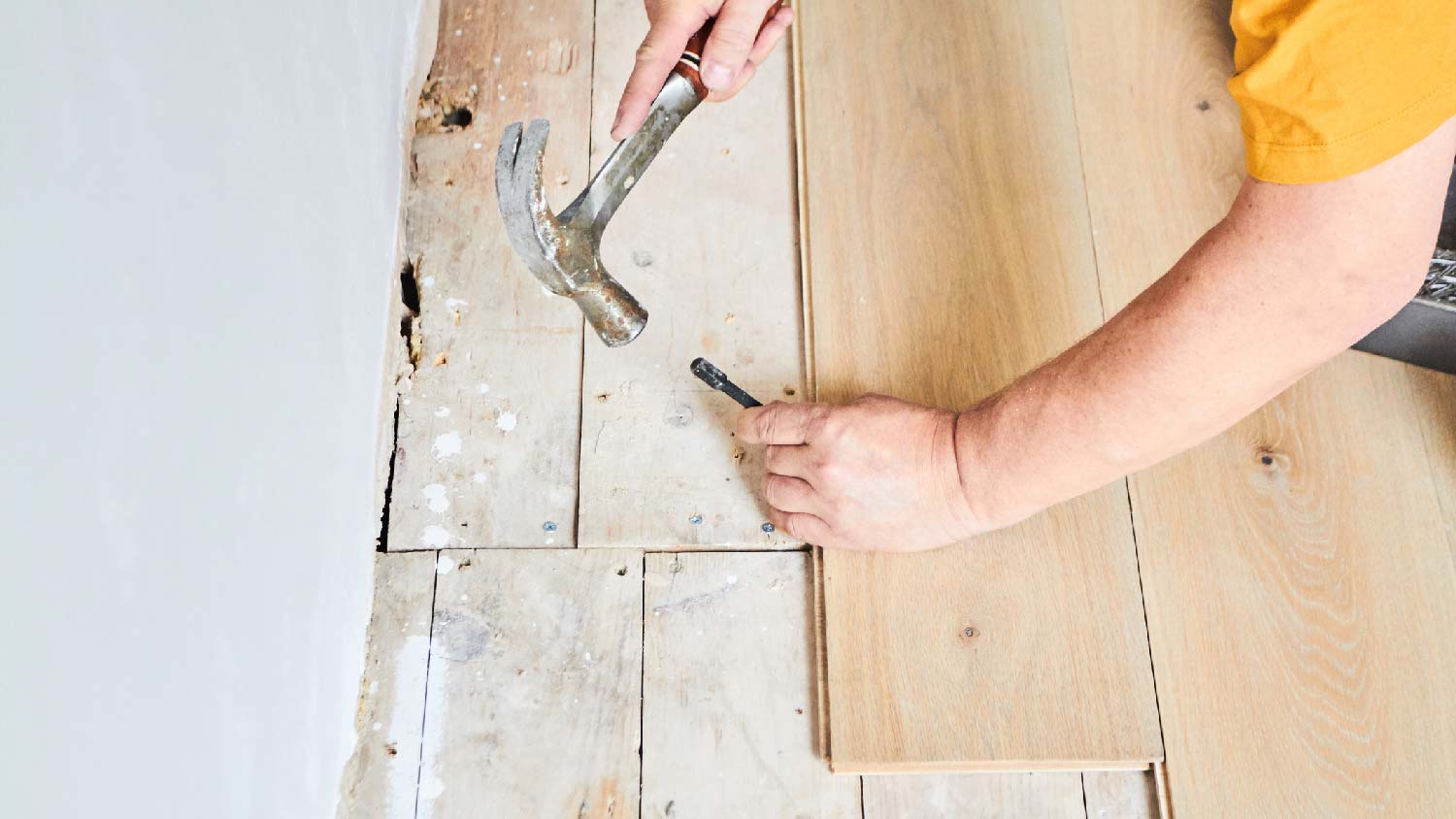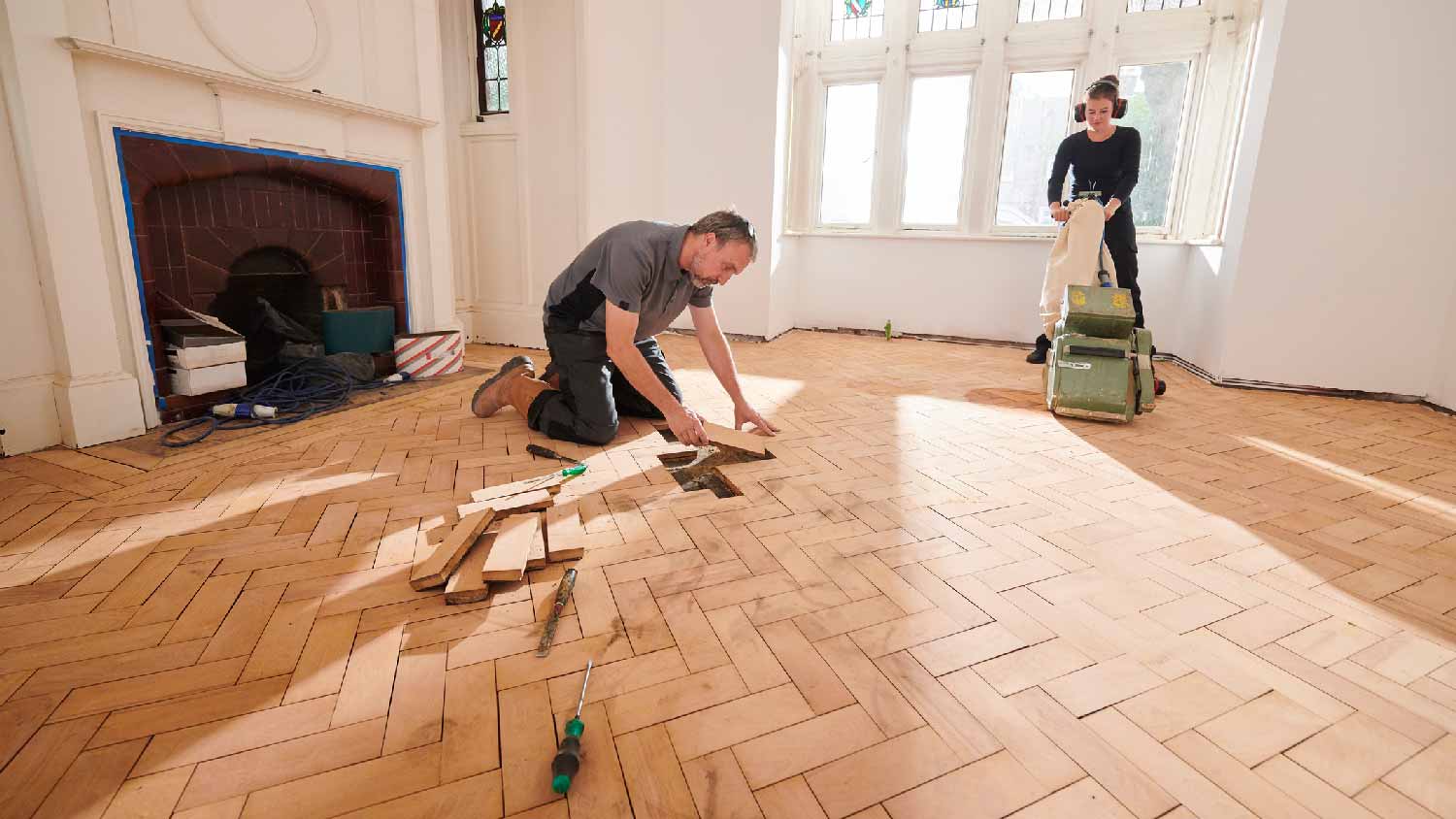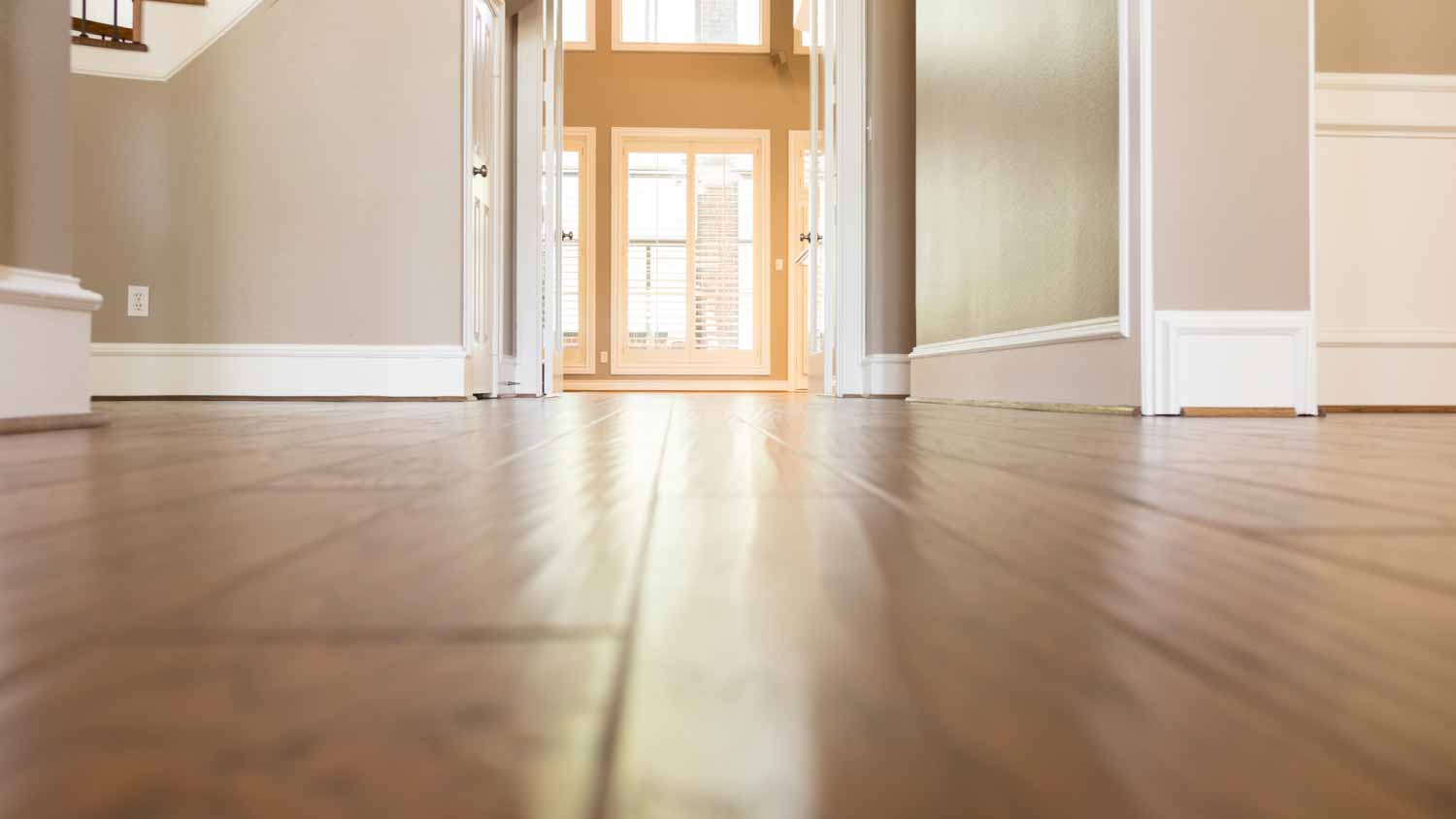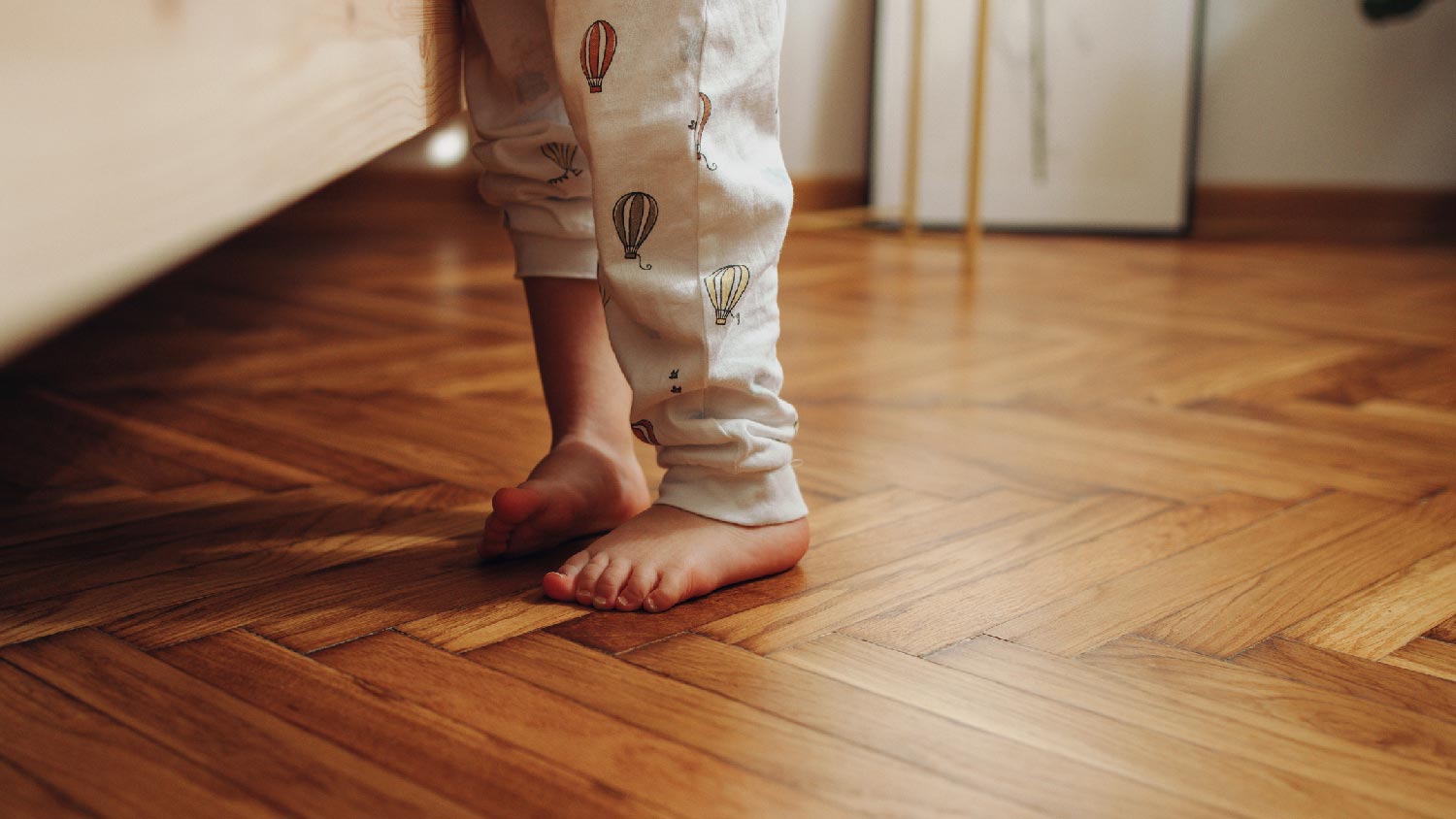How Much Does Hardwood Flooring Installation Cost? [2025 Data]
Hardwood flooring installation costs $2,469 to $7,033, with an average of $4,726. A pro will set the price depending on the size of your room and quality of the materials.


Hardwood floor installation costs $4,726 on average. This cost normally ranges from $2,469 to $7,033, or between $6 and $25 per square foot for both labor and material. You might pay up to $12,000 or more for high-end woods or large jobs. Your total cost will depend on the room size and the type of wood you choose.
Adding hardwood floors to your space is an investment that can lead to major benefits. For one, it’s easier to care for and maintain than carpet—so parents can say goodbye to juice stains forever. It also lasts longer than tile because it can be finished (and refinished) time and time again. In most cases, it can serve your home for a lifetime.
Hardwood Flooring Installation Cost Factors
The total cost of hardwood flooring installation varies based on room size, repair needs, and characteristics of the wood planks, such as the type of hardwood, grade, hardness, species, width, and thickness.
Cost per Square Foot
The national average cost to install hardwood flooring is $6 to $12 per square foot for labor and material fees. For higher-end wood and larger spaces, like if you’re redoing your entire first floor in hardwood, you may pay more—possibly between $13 and $25 per square foot. Here’s what you may pay depending on your home size and how much flooring you’re interested in replacing.
| Room Size (Square Feet) | Average Cost |
|---|---|
| 150 | $1,100–$3,800 |
| 250 | $1,800–$6,300 |
| 500 | $3,400–$13,000 |
| 1,000 | $6,000–$24,000 |
| 1,200 | $8,500–$31,500 |
| 1,500 | $10,000–$36,400 |
| 2,000 | $12,000–$48,000 |
Type of Hardwood Flooring
Hardwood flooring is a broad category that includes several different styles and patterns of flooring. Solid hardwood is the traditional type, but you'll also find engineered wood and parquet flooring made from wood. Material and installation costs will depend on which one you choose.
| Type of Hardwood Floor | Average Cost (Per Square Foot) |
|---|---|
| Solid hardwood | $5–$28 |
| Prefinished hardwood | $6–$12 |
| Engineered hardwood | $4.50–$16 |
| Genuine parquet | $20–$45 |
| Faux parquet | $7–$15 |
Labor
Most wood flooring costs come from materials rather than labor. On average, labor costs $3 to $6 per square foot. However, you may end up paying more for jobs that take longer. This includes installing planks that have to be finished on-site, patterns like herringbone and parquet, or installations in complex layouts with unique corners.
On the other hand, you may only spend $3 to $4 per square foot on labor when installing wide plank floors since they cover more area and take less time to put in.
Additional Costs to Consider
In addition to room size and type of floor, several other factors affect the final cost of hardwood floors. The type of hardwood, plank thickness, finishing, and coating can all affect the final cost. In some cases, these factors increase the cost of labor, materials, or both.
Species of Wood

There are many different species of wood to choose from, all with associated costs. The best wood species for your hardwood flooring installation depends on the installation location and the foot traffic it’ll see.
| Wood Species | Average Cost (Per Square Foot) | Benefit |
|---|---|---|
| Maple | $4–$15 | Hard and dense, making it durable |
| Red oak | $5–$11 | Very durable with a long life span |
| White oak | $5–$12 | Suitable for both indoor and outdoor flooring |
| Hickory | $6–$14 | A great option for high-traffic areas |
| White ash | $6–$14 | Acts as a sound absorber due to elasticity |
| Brazilian walnut | $9–$15 | Resistant to dents, fire, insects, and fungi |
While durable flooring options may cost more, consider the wear and tear your floor will withstand in high-traffic areas, especially in homes with children and pets. If you’d like help choosing a material, a flooring pro can recommend strong materials that will look great in your home.
Wood Hardness
The harder a wood is, the more effort it takes to install. Expect hardwoods (think Brazilian walnut) to require more elbow grease than softwoods (like pine). For this reason, the materials you choose cause hardwood floor installation costs to vary widely.
Thickness
Hardwood is often 3/4 inches, 5/8 inches, or 1/2 inch thick, though you can also find options in other thicknesses. Thicker flooring can cost a bit more than thinner floors, but the thicker the wood, the more it can withstand everyday use. A wood floor pro can help you choose the best wood thickness for your floor.
| Wood Thickness | Average Cost Per Sq. Ft. (Materials Only) | Best Use |
|---|---|---|
| 3/8 inch | $3–$8 | Lightest foot traffic areas |
| 5/8 inch | $4–$10 | Lighter traffic areas, like guest rooms |
| 1/2 inch | $4–$13 | Medium foot traffic areas, like bedrooms |
| 3/4 inch | $5–$16 | High-traffic areas |
Wood Grade
Hardwood flooring falls into grades or categories based on physical characteristics. Low-grade floors have a natural, rustic character with knots, color variations, and mineral streaks. These cost about $6 to $18 per square foot installed. High-grade wood, or clear wood, has a more uniform look and color without imperfections. This tier costs anywhere from $8 to $23 per square foot.
| Wood Grade | Characteristics |
|---|---|
| Cabin (or #3 Common Grade) | Rustic aesthetic with significant color variations and other pronounced imperfections |
| Character (or #2 Common Grade) | Some color variation, knots, and other imperfections with a natural look. |
| Natural (or #1 Common Grade) | Some slight knots and color variation, less rustic looking |
| Select (or Clear Grade) | Minimal to no knots, color variations, or imperfections |
Width

Hardwood planks tend to be 5 inches wide or narrower. However, wide plank formats cost more at $4.50 to $18 per square foot for materials alone. You'll need fewer boards to cover a floor with wide planks (6- to 12-inch-wide boards), so they can reduce labor costs.
Color and Grain
Wood color varies dramatically across species, including:
Light and pale tones
Warmer, medium tones
Rich, dark tones
You'll also see price variations by cut. Plain-sawn planks with a wave-like pattern are the most affordable, while quarter-sawn planks with straighter grain are more expensive. One rare pattern is the highly linear grain of rift-sawn boards, which cost even more.
Carpet Removal
If you’re swapping carpet for wood floors, you’ll need to pay to have it removed. On average, the extra cost for carpet removal will be between $150 and $250. You can reduce your overall project cost by doing this step yourself.
Floor Joist Repairs
When replacing an existing floor, you or your installer may discover mold, insect, or water damage to the joists below. Extensively rotted joists will need repairs before you install new floors. Signs of damage are creaky floors and doors that begin to stick. Subfloor repairs can cost an additional $900 to $3,000, while joist repairs cost an extra $40 to $60 per square foot.
Finishing and Coating
Finish refers to the protective coating applied to hardwood to extend its durability. Some hardwood comes prefinished for an extra $2 per square foot, reducing labor costs. Finishing unfinished wood after installation adds $2 to $7 per square foot in labor.
Additionally, different types of finishes vary in cost. For example, a polyurethane finish costs less than a penetrating resin finish.
Herringbone Pattern
If you opt for a gorgeous herringbone pattern, none of the materials you need will change, but the amount of time the project takes and the overall cost will. Choosing this style can add an extra 30% to your final bill because of the extra care required for installation. Expect to pay $12 per square foot to have any type of wood arranged in this fashion.
DIY Hardwood Flooring Installation Cost vs. Hiring a Pro
It’s best to hire a local wood floor installer to do this job right. Proper installation of traditional solid hardwood flooring requires training, equipment, and experience that most DIYers don't have. Here are just a few things a pro will have experience with:
Accounting for changing temperatures and humidity
Installing vapor barriers for moisture protection
Custom patterns and exotic hardwoods
Manipulating around fireplaces, closets, counters, and cabinets
Proper subfloor and slab preparation
Measuring to provide space for glue or nails
Joist repair
Improper installation can cause wood floors to crack, bow, warp, split, or shrink over time. You also risk damaging wiring or plumbing in the process. If you know the risks and feel up to the task, start with a more forgiving type of hardwood that's easier to fix, such as engineered wood, floating floors, or click-and-lock tiles.
Hardwood or other solid wood floors are not good candidates for wet areas of a home. Liquids can soak into natural wood floors and cause finishes to discolor or fail, particularly at the joints between the boards or near the ends of the boards next to the baseboards.
Signs You Need to Replace Your Hardwood Floors
While you may choose to update hardwood floors as a personal preference, certain signs can indicate that your floors need replacing before serious damage occurs. Keep an eye out for the following:
Cracked, warped, or buckling planks
Gaps between boards, which may indicate that those boards have become detached
Mold growth, which may indicate an underlying moisture issue
Loose, creaking, or shifting floorboards, which may indicate structural issues
Fading from sun damage
Scratches, dents, or other irreparable surface damage
Visible nail heads, which may indicate that the floor has been sanded too many times
Dark stains or soft spots that result from water damage
Repair vs. Replace vs. Refinish Hardwood Flooring
If your current hardwood floors are in good shape with a few minor dents, dings, or gouges, you could refinish them. Refinishing hardwood floors costs about $3 to $8 per square foot. You can refinish solid hardwood multiple times, but engineered wood can only be refinished once or twice. Repairing or replacing individual boards costs more but is still less costly than a new installation.
Refinishing hardwood floors involves sanding the floor to remove superficial damage and to remove the finish before applying a new stain and sealant. It’s a good option when minor surface scratches occur across a large portion of a hardwood floor. Traditional refinishing costs $3 to $8 per square foot, while dustless refinishing costs $5 to $8 per square foot.
Significant water damage or deep gauges that penetrate the wood’s stain and finish are reasons to replace a hardwood floor. Sometimes, you can replace a plank or two if the damage is limited to a small area. Replacing a hardwood floor involves removing and replacing all the planks and the subfloor if necessary.
How to Save on Hardwood Flooring Costs

There are plenty of ways to reduce the cost of hardwood flooring installation without sacrificing the quality of your floors. Here are a few tips:
Think beyond looks: Install a less expensive wood species, grain, thickness, or grade.
Refinish, don't replace: It costs much less to restore hardwood than to replace it.
Install prefinished wood: Trade higher up-front costs for lower labor costs.
Rip up your own carpet: DIY carpet disposal is less risky and can help cut labor costs.
DIY engineered wood: Engineered wood is simpler and less costly to install and repair.
Break up the project: Instead of installing new flooring in the whole house, start with a new floor in one or two rooms.
Do Hardwood Floors Increase Home Value?
The National Association of Realtors® reports that:
Refinishing hardwood floors has a cost recovery of up to 147%
New wood floors have a cost recovery of up to 118%
In short, if you resell your home after doing either upgrade, you’ll likely see a return on investment (ROI) and then some because refinishing and installing new hardwood floors add value to your home.
If you plan to sell your home, refinishing takes less time and money than a new installation, giving you a bigger ROI. If you plan to stay in your home, replacing wood floors can offer long-term improvements in the flooring’s appearance.
How Angi Gets Its Cost Data
Home is the most important place on earth, which is why Angi has helped more than 150 million homeowners transform their houses into homes they adore. To help homeowners with their next project, Angi provides readers with the most accurate cost data and upholds strict editorial standards. We’ve surveyed over 10,000 real Angi customers about their project costs to develop the pricing data you see, so you can make the best decisions for you and your home. We pair this data with research from reputable sources, including the U.S. Bureau of Labor Statistics, academic journals, market studies, and interviews with industry experts—all to ensure our prices reflect real-world projects.
Want to help us improve our cost data? Send us a recent project quote to costquotes@angi.com. Quotes and personal information will not be shared publicly.
Frequently Asked Questions
Hardwood floors are expensive, but they are also incredibly durable and can last decades with proper care. Along with being long-lasting, hardwood floors can give you an incredible ROI—up to 118% on average. Most homeowners find hardwood floors worth the initial investment, so keep that in mind when deciding which way to go.
Hickory, red oak, white oak, and Brazilian walnut are among the most durable wood flooring options. Teakwood is extremely durable and known as one of the hardest woods. It holds up against weather and sunlight, but it’s costly and can be difficult to source. Keep durability in mind when installing floors for high-traffic areas in your home.
Solid wood planks are each made from a single piece of wood, while engineered planks have a top layer of natural wood with wood sheets underneath for stability. Solid wood costs more, but it lasts longer and can be refinished multiple times. Engineered wood costs less and can be installed below grade.
Hardwood floors should be refinished as often as every 7 to 10 years to maintain the floors’ quality and durability. More frequent refinishing is usually recommended if the floors are exposed to excessive direct sunlight or if they regularly endure a lot of heavy foot traffic.
The life span of hardwood flooring mainly depends on the type of hardwood you’ve installed. Solid hardwood flooring options can last between 30 and 100 years, whereas engineered hardwoods need replacing every 20 to 30 years. If you’re unsure whether to repair, refinish, or completely replace your existing hardwood floors, speak with a hardwood installer to determine your best course of action.


















